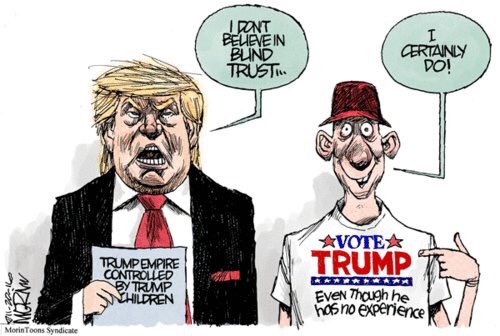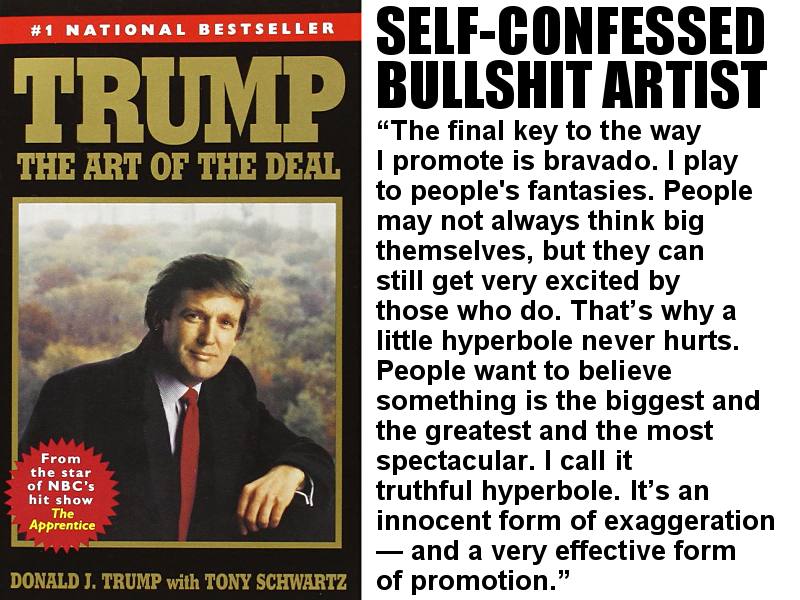



Hello 'Pussy' it's Mrs. Piggle-Wiggle and Pippi Longstocking:
Faith in American leadership has plunged in many nations around the world in the months since you took office, according to a new survey, underscoring the challenges facing the new president as he prepares to make his second overseas trip next week.
Just
22 percent of those interviewed outside the United States expressed
confidence in you to do the right thing, compared with 64 percent
who had similar confidence in the late stages of President Barack Obama’s administration, according to the Pew Research Center.


you can join Betty MacDonald fan club on Facebook.
Thank you so much in advance for your support and interest.Did you know that Mary Bard's Best Friends series for children have been more successful in some countries than Betty MacDonald's Nancy and Plum and The Mrs. Piggle-Wiggle series?
I agree with author Peter Sieruta.
The Betty MacDonald Fans enjoy these interviews very much.
Alison Bard Burnett, Alison Beck and Wolfgang Hampel are really great.
Interview with Alison Bard Burnett and her daughter Alison Beck:
Peter D. Sieruta, author of Heartbeats and other stories:
I heard Wolfgang Hampel's Betty MacDonald Fan Club audio interview with Alison Beck who came and stayed with her aunt Mary Bard as she wrote Best friends at school. Mary’s own daughters were grown by that point, and she needed a real live girl to serve as a “consultant” when writing about young Suzie and CoCo. Alison Beck recalled that magical summer of 1960 and how the sunlight filled her aunt’s window-lined office during the day as they worked together; in the evening they gathered around the television to watch JFK accept the Democratic nomination for president. Alison Beck remembered how grown-up she felt that summer, helping to create book and discussing politics and current events with a special aunt.
We are going to publish some new Betty MacDonald fan club interviews by Betty MacDonald fan club founder Wolfgang Hampel.
Yours,
Sanna
you can join
Betty MacDonald fan club
Betty MacDonald Society
Vita Magica
Eurovision Song Contest Fan Club
on Facebook
Vita Magica Betty MacDonald event with Wolfgang Hampel, Thomas Bödigheimer and Friedrich von Hoheneichen
Vita Magica
Betty MacDonald
Betty MacDonald fan club
Betty MacDonald fan club on Facebook
Betty MacDonald forum
Wolfgang Hampel - Wikipedia ( English )
Wolfgang Hampel - Wikipedia ( English ) - The Egg and I
Wolfgang Hampel - Wikipedia ( Polski)
Wolfgang Hampel - Wikipedia ( German )
Wolfgang Hampel - LinkFang ( German ) Wolfgang Hampel - Academic ( German )
Wolfgang Hampel - cyclopaedia.net ( German )
Wolfgang Hampel - DBpedia ( English / German )
Wolfgang Hampel - people check ( English )
Wolfgang Hampel - Memim ( English )
Vashon Island - Wikipedia ( German )
Wolfgang Hampel - Monica Sone - Wikipedia ( English )
Wolfgang Hampel - Ma and Pa Kettle - Wikipedia ( English )
Wolfgang Hampel - Ma and Pa Kettle - Wikipedia ( French )
Wolfgang Hampel - Mrs. Piggle-Wiggle - Wikipedia ( English)
Wolfgang Hampel in Florida State University
Betty MacDonald fan club founder Wolfgang Hampel
Betty MacDonald fan club interviews on CD/DVD
Betty MacDonald fan club items
Betty MacDonald fan club items - comments
Betty MacDonald fan club - The Stove and I
Betty MacDonald fan club groups
Betty MacDonald fan club organizer Linde Lund
Betty MacDonald fan club organizer Greta Larson
Few Overseas Have Faith in Trump’s Leadership, Survey Finds

WASHINGTON — Faith in American leadership has plunged in many nations around the world in the months since President Trump
took office, according to a new survey, underscoring the challenges
facing the new president as he prepares to make his second overseas trip
next week.
Just
22 percent of those interviewed outside the United States expressed
confidence in Mr. Trump to do the right thing, compared with 64 percent
who had similar confidence in the late stages of President Barack Obama’s administration, according to the Pew Research Center. In only two of 37 countries in the survey did Mr. Trump fare better than Mr. Obama: Russia and Israel.
“Trump
and many of his key policies are broadly unpopular around the globe,
and ratings for the U.S. have declined steeply in many nations,” the
center said in a report released on Monday. “The sharp decline in how
much global publics trust the U.S. president on the world stage is
especially pronounced among some of America’s closest allies in Europe
and Asia, as well as neighboring Mexico and Canada.”
The findings come despite concerted efforts by Mr. Trump to build relationships with world leaders. On Monday, he met with Prime Minister Narendra Modi of India at the White House and he is scheduled to host President Moon Jae-in of South Korea for a two-day visit starting on Thursday. As president, he has brought the leaders of China and Japan to his Mar-a-Lago estate in Florida and telephoned other world leaders dozens of times.
Next week, Mr. Trump heads to Europe to visit Poland and attend a meeting of the Group of 20 world powers in Hamburg, Germany, where he may also sit down with President Vladimir V. Putin of Russia for the first time since taking office.
Mr.
Trump’s first international trip, last month, won him praise from Arab
and Israeli leaders in the Middle East but alienated America’s
traditional allies in Europe over issues like trade, climate change and the role of NATO.
Shortly
after returning to Washington, he drove a further wedge between himself
and the international community when he announced that the United
States would withdraw from the Paris climate accord negotiated by Mr. Obama. Every other nation in the world belongs to the pact except Nicaragua, which argued that it did not go far enough, and Syria, which is consumed by civil war. And only after his return did Mr. Trump grudgingly affirm support for NATO’s Article 5 mutual defense provision, stating that an attack on one member was an attack on all.
It
may come as little surprise that a president espousing an “America
first” approach to the world would not be viewed favorably outside its
borders, and many of Mr. Trump’s supporters are unlikely to be bothered
by that — indeed, they may see it as proof that he is tending to their
needs, not those of foreigners. One of Mr. Trump’s central themes both
as a candidate and as president is that America has been treated
unfairly by other countries, whether it be in economics, security
arrangements or agreements like the Paris accord.
In
that vein, he has been willing to advance policies that he argues
reflect American interests even at the cost of complaints from abroad,
including travel restrictions on selected predominantly Muslim countries
that were partially restored by the Supreme Court on Monday, construction of a wall along the Mexican border, and withdrawal from the Trans-Pacific Partnership trade agreement with Asia.
“My job is not to represent the world,” Mr. Trump said in an address to a joint session of Congress in February. “My job is to represent the United States of America.”
Some
of those policies generate broad criticism overseas. Sixty-two percent
of those surveyed by Pew disapproved of the travel restrictions and more
than 70 percent opposed the United States’ withdrawing from major trade
and climate change agreements. Ninety-four percent of those interviewed
in Mexico opposed Mr. Trump’s proposal for a border wall.
But
it is not just his specific policy agenda that creates antipathy in
other countries. Seventy-five percent of those surveyed described Mr.
Trump as arrogant, 65 percent called him intolerant and 62 percent said
he was dangerous. Still, in a metric that may appeal to Mr. Trump, 55
percent characterized him as a strong leader.
Despite
the eroding belief in its president, the United States itself and its
people and culture still retained support around the world. Majorities
expressed favorable views of Americans; their music, movies and
television shows; and their traditions of personal freedom, although
feelings were mixed about American ideas about democracy.
The collapse in confidence in the president echoed that of the last phase of President George W. Bush’s tenure, when the Iraq war and the global financial crisis had sapped international faith in American leadership.
The falling support was most pronounced among longtime American friends. While 93 percent in Sweden
had faith in Mr. Obama to do the right thing, only 10 percent had such
confidence in Mr. Trump, a drop of 83 percentage points. The drop was
also large in Germany and the Netherlands (75 percentage points), South Korea (71 points), France (70 points), Spain (68 points) and Britain (57 points).
In
Mexico, only 5 percent expressed positive feelings about Mr. Trump, the
least in any of the 37 countries. In Canada, confidence in the
president fell from 83 percent to 22 percent, the lowest it has been in
the 15 years that the survey has been conducted. In addition to the
border wall, Mr. Trump’s threat to rip up the North American Free Trade Agreement unless it is renegotiated to his liking has soured America’s closest neighbors.
The
only two places where Mr. Trump bested Mr. Obama were Israel, where 56
percent expressed faith in the current president, a seven-point rise,
and Russia, where 53 percent gave Mr. Trump high marks, a 42-point rise.
The global attitudes survey, which has been conducted since 2002, surveyed 40,447 respondents from Feb. 16 to May 8.
